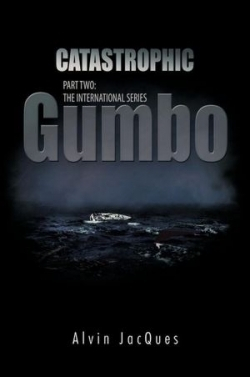Catastrophic Gumbo: Part II
The International Series
As a collector, compiler, and cataloger of interesting facts concerning disasters both natural and man-made, Alvin JacQues deserves credit for the determination and diligence he demonstrates in his second volume in the Catastrophic Gumbo series. Unfortunately, his work is so mortally flawed by awful grammar, poor punctuation, and abysmal abuse of adjectives as to render it nearly unreadable. The presentation is so poor that the reader must question the accuracy of the facts and statements found in the book. This is a shame, because JacQues has obviously done his research and poured his heart into his book.
The book’s problems are as much a disaster as the floods, earthquakes, and other calamities that comprise its contents. Just as the damage done by catastrophic events can be cleaned up, this book could be made whole again. A professional editor might even make it seaworthy.
In this era of print-on-demand publishing, JacQues’ errors can be fixed. And his work does deserve repair. The forty-five natural and fifteen man-made disasters he catalogues make for interesting reading. Although presented as thumbnail sketches of great calamities, these selections do include the basic facts of ship sinkings, volcanic eruptions, earthquakes, floods, and other catastrophic events. The author also includes nearly two-dozen short essays on topics of science, history, love, faith, and finance, some of which serve as a welcome and positive counterpoint to the roster of doom, death, and despair that is the stock of his “gumbo.”
A few of these offerings, notably “The Limitations of Money” and “What is Love,” are mere lists. Others, such as “What is Faith” (a title presented without a question mark, as is “What is Love”) are true essays that infuse the book with JacQues’ own honest and deeply held personal values and opinions. His essays are not mere afterthoughts. They put the list of disasters he presents into perspective.
In his compilation, JacQues shows his readers that life can be cut short or dramatically altered by disasters over which people have little, if any, control. The essays are the author’s reminder to those who have been spared such calamities to use their transitory time on Earth well—to ponder and try to understand what it means to be alive.
JacQues’ book is worth saving, but it needs a fine editor to come to the rescue.
Reviewed by
Mark G. McLaughlin
Disclosure: This article is not an endorsement, but a review. The publisher of this book provided free copies of the book and paid a small fee to have their book reviewed by a professional reviewer. Foreword Reviews and Clarion Reviews make no guarantee that the publisher will receive a positive review. Foreword Magazine, Inc. is disclosing this in accordance with the Federal Trade Commission’s 16 CFR, Part 255.

